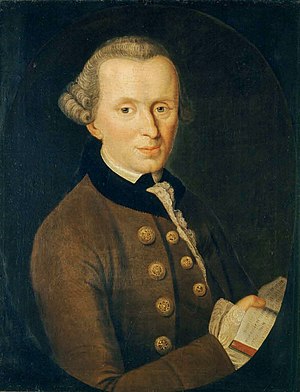
It is true, no doubt, that this principle of the necessary unity of apperception is itself an identical and therefore an analytic proposition; but it shows, nevertheless, the necessity of a synthesis of the manifold given in an intuition, a synthesis without which it would be impossible to think the thoroughgoing identity of self-consciousness. For through the *I*, as a simple representation, nothing manifold is given; only in intuition, which is distinct from this representation, can a manifold be given, and then, through *combination*, be thought in one consciousness. An understanding in which through self-consciousness all the manifold would be given at the same time would be one that *intuits*; our understanding can do nothing but *think*, and must seek intuition in the senses. I am conscious, therefore, of the identical self with respect to the manifold of the representations that are given to me in an intuition, because I call them one and all *my* representations, as constituting *one* intuition. This means that I am conscious *a priori* of a necessary synthesis of them, which is called the original synthetic unity of apperception, and under which all representations given to me must stand, but under which they must also be brought by means of a synthesis.”—from_Critique of Pure Reason_. Translated, edited, and with an Introduction by Marcus Weigelt, based on the translation by Max Müller, pp. 128-129
Share this quote:
What can I know? What ought I to do? What can I hope?
Share this quote:
All the interests of my reason, speculative as well as practical, combine in the three following questions: 1. What can I know? 2. What ought I to do? 3. What may I hope?
Share this quote:
Even philosophers will praise war as ennobling mankind, forgetting the Greek who said: War is bad in that it begets more evil than it kills.
Share this quote:
Morality is not the doctrine of how we may make ourselves happy, but how we may make ourselves worthy of happiness.
Share this quote:
Happiness is not an ideal of reason, but of imagination.
Share this quote:
It is not Gods will merely that we should be happy, but that we should make ourselves happy.
Share this quote:
Immaturity is the incapacity to use ones intelligence without the guidance of another.
Share this quote:
Religion is the recognition of all our duties as divine commands.
Share this quote:
It is beyond a doubt that all our knowledge begins with experience.
Share this quote:
I had therefore to remove knowledge, in order to make room for belief.
Share this quote:
Intuition and concepts constitute... the elements of all our knowledge, so that neither concepts without an intuition in some way corresponding to them, nor intuition without concepts, can yield knowledge.
Share this quote:
“Enlightenment is mans release from his self-incurred tutelage. Tutelage is mans inability to make use of his understanding without direction from another. Self-incurred is this tutelage when its cause lies not in lack of reason but in lack of resolution and courage to use it without direction from another. Sapere aude! Have courage to use your own reason!- that is the motto of enlightenment.”
Share this quote:
“Rules for happiness: something to do, someone to love, something to hope for.”
Share this quote:
“Settle, for sure and universally, what conduct will promote the happiness of a rational being.”
Share this quote:
“The death of dogma is the birth of morality.”
Share this quote:
“In every department of physical science there is only so much science, properly so-called, as there is mathematics.”
Share this quote:
“Two things fill the mind with ever new and increasing admiration and awe, the more often and steadily we reflect upon them: the starry heavens above me and the moral law within me. I do not seek or conjecture either of them as if they were veiled obscurities or extravagances beyond the horizon of my vision; I see them before me and connect them immediately with the consciousness of my existence.”
Share this quote: